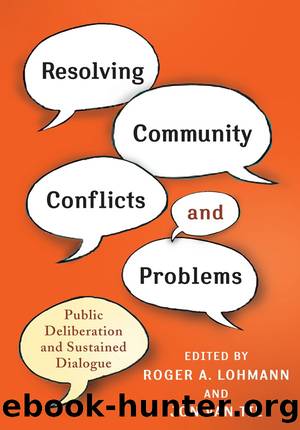Resolving Community Conflicts and Problems by Roger Lohmann Jon Van Til

Author:Roger Lohmann, Jon Van Til [Roger Lohmann, Jon Van Til]
Language: eng
Format: epub
ISBN: 9780231525282
Barnesnoble:
Publisher: Columbia University Press
Published: 2011-10-18T00:00:00+00:00
DERRY AND ORGANIC SUSTAINED DIALOGUE
Several things stand out about the Derry experience and link it to Saundersâs (1999) ideas about sustained dialogue. Derry was a center of conflict throughout the troubles, and its internal relationships added fuel to the conflict at key points. Bringing the hostilities of that period to an end required fundamental change in Derry. Macrolevel changes made key parties less committed to warfare, which made resources available for community building. But that community building could only happen when local community leaders acted aggressively and with vision.
Critically, the process started with a small number of leaders who, within their own frames of reference, created cross-community tiesâties between the bishops, between specific business leaders, among politicians. What seems to have begun as relatively specific, perhaps pair-based relationships expanded in the late 1980s into a small leadership group. This group then undertook strategic projects meant to create a context for cross-community relationships, then build strong community initiatives for cross-community relationships, and then finally address certain recurrent conflict issues. Out of this came a generalized community commitment to peace. People want to sustain peace even when cross-community tensions remain high.
SUSTAINED DIALOGUE
We find the framework of sustained dialogue helpful for understanding developments in Derry because it implies a strategic plan and clear stages of development. What strikes an observer in Derry is that there is a definite story with key actors, a process of development, a specific vision, and a denouement of a local civil society committed to nonviolence. Sustained dialogue is conceived as a process with stages, and it will be helpful to frame the Derry story in terms of these stages.
1. DECIDING TO ENGAGE Hal Saunders has experienced sustained dialogue as a powerful diplomat, an individual with great personal influence who enters a national conflict and seeks out leaders who are willing to meet people from opposing communities and to spend time over a span of years getting to know them. In polarized communities, simply meeting people from the other side is usually difficult, dangerous, and unappetizing. Saunders argues, however, that peace can only be accomplished if the combatants choose not to fight and for this to happen citizens must be involved in the process. Saunders is careful in whom he chooses since he can foster only a small number of cross-community relationships through his personal intervention; he often sets up a process of regular meetings or seminars that continue for years. Thus, he concentrates on emerging leaders with the expectation that they will become significant national figures in years to come and bring an understanding of the opposing culture and strong person ties into the political roles.
In the 1980s key Derry leaders reached across community boundaries to form relationships and often strong friendships with parallel figures on the other side. It is important that these relationships began as private gestures and that dialogue began in intimate terms, person to person. People shared small challenges in their work and in their private lives, and from this they came to trust one another and enjoy one anotherâs company.
Download
This site does not store any files on its server. We only index and link to content provided by other sites. Please contact the content providers to delete copyright contents if any and email us, we'll remove relevant links or contents immediately.
Collaborating with Parents for Early School Success : The Achieving-Behaving-Caring Program by Stephanie H. McConaughy; Pam Kay; Julie A. Welkowitz; Kim Hewitt; Martha D. Fitzgerald(897)
Entrepreneurship Education and Training: The Issue of Effectiveness by Colette Henry Frances Hill Claire Leitch(665)
Adding Value to Policy Analysis and Advice by Claudia Scott; Karen Baehler(499)
Materializing the Middle Passage by Jane Webster;(496)
Race and American Political Development by unknow(488)
Sociological Perspectives of Health and Illness by Constantinos N. Phellas(478)
American Government and Politics Today by Steffen W. Schmidt Mack C. Shelley Barbara A. Bardes(475)
Human and Global Security : An Exploration of Terms by Peter Stoett(461)
Control Of Oil - Hardback by Kayal(457)
The Disappearance of Rituals: A Topology of the Present by Byung-Chul Han(398)
Advances in Child Development and Behavior, Volume 37 by Patricia J. Bauer(396)
The Catholic Church and European State Formation, AD 1000-1500 by Jørgen Møller(388)
The World According to China by Elizabeth C. Economy(379)
Theories of Counseling and Psychotherapy: A Case Approach by Nancy L. Murdock(370)
Left Is Not Woke by Susan Neiman(367)
Application of classical statistics, logratio transformation and multifractal approaches to delineate geochemical anomalies in the Zarshuran gold district, NW Iran by unknow(362)
Turkey's Relations with the West and the Turkic Republics: The Rise and Fall of the Turkish Model by Idris Bal(353)
Cross-Cultural Child Development for Social Workers by Lena Robinson(348)
Japan's Ainu Minority in Tokyo by Mark K. Watson(331)
